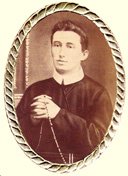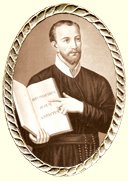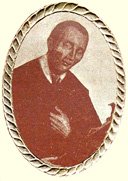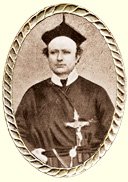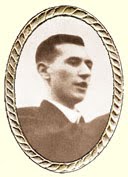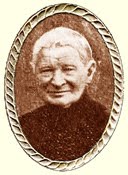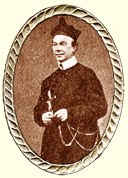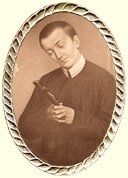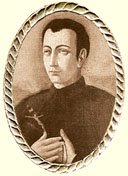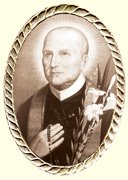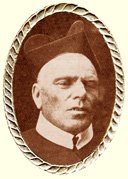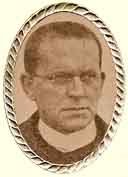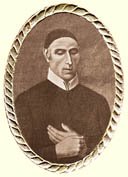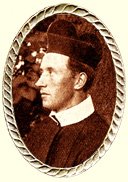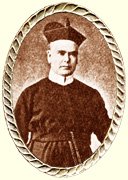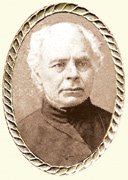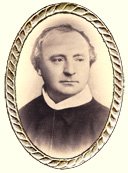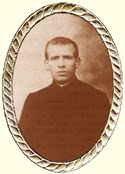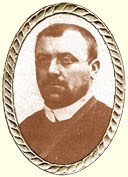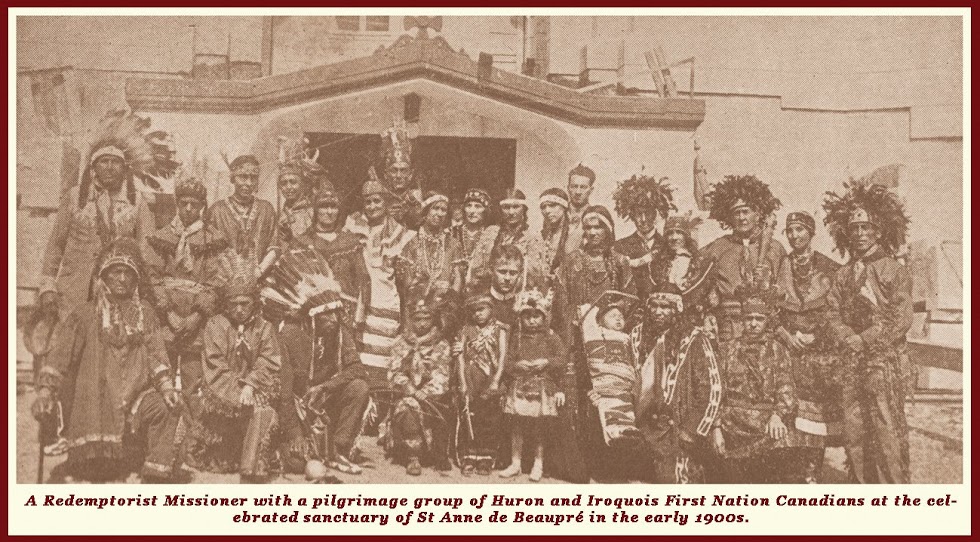The Servant of God Rev. Fr Alfred Pampalon, C.SS.R. (1867 – 1896)
At Home
Beautiful and fair to behold, is the little town of Levis, situated on the bank of the St Laurence, opposite Quebec. It was here that the Servant of God, Alfred Pampalon was born, November 24th, 1867. He received holy Baptism the same day.
His parents were fervent Christians. Virtue surrounded his cradle; and once he was capable of it, he loved it with his whole heart. Virtue was his companion in life, and now it sanctifies his tomb.
The Pampalon family hearth was a true expression of that beautiful name bestowed upon it at times; it was a sanctuary, that is, a home rendered sacred by the piety of the parents and the obedience of the children. The father, Anthony Pampalon was an upright and deeply Christian soul, and still lives in the memories of those who knew him. The mother, Josephine Dorion, though very soon removed from her children’s affections, left impressed on their hearts once and for all, a remembrance of the most gentle and most deep-rooted virtues. It was a numerous family, but the more it increased the more blest did the parents esteem themselves.
Alfred was the ninth. Several brothers and sisters grouped themselves around his cradle, each of whom lovingly obeyed the word of their holy and kind-hearted mother. To their hearts she spoke that tender and pious language, whose secret God imparts to mothers. In her eyes, to train her children was to carry them higher, nearer to heaven, to those serene heights of holiness where the passing worldly breezes sully not the soul.
It was in his mother’s heart that he gathered those seeds of virtue, that devotion to Mary, which was to remain throughout his life a characteristic trait of his piety. The unspeakable bounty of his earthly mother helped him to realise the infinite goodness of his Heavenly Mother. ”What a happy moment it was for me, Mary,” Alfred wrote later, “in the early years of my childhood, to hear thy sweet name on my mother’s lips. At the sound of thy sweet name my heart trembled with joy.”
On the principal feasts of the Most Holy Virgin, Mrs. Pampalon brought her children to the church. Having opened their hearts to holiness, so as to make virtue take seed and flourish therein, this holy mother could imagine nothing better than to see Jesus united to them in Holy Communion.
Her affection for Alfred seemed more pronounced. She said one day to one of her lady friends: “My little Alfred will not live long; but if he is little on earth, he will be great in Heaven. He is my little saint.”
When he was six years of age, he lost his virtuous mother. How touching are the words this fervent Christian addressed to her children on her death-bed: “Dear children,” she said to them: “God is calling me to Himself. Soon you will no longer have an earthly mother; but raise your eyes to Heaven; there you have a Mother, the best and most powerful of mothers. It is to her that I consecrate and confide you. Love her greatly and she will love you and always protect you. In Heaven I shall pray to God to keep you good Christians and will ask Him to choose priests from my family.”
Alfred listened to the pious recommendation of his dying mother with a heart full of sorrow. He was told, for his consolation, that his mother would await him in Heaven, with the Blessed Virgin and the angels; and that one day he would go and see her, if he was good and always obedient. He promised, on his part, to be a saint in order to go to Heaven, which must be very beautiful, since with its enjoyment God had recompensed his holy mother.
Providence soon chose another mother for our pious youth, by giving Anthony another wife. The virtues of the former seemed to be the heritage of the latter. She applied herself with all her heart to closing the wounds in the hearts of the orphans of her new family. Alfred loved her most tenderly and tried to find occasions for giving her pleasure. He willingly assisted her in all the household duties, and found his happiness in sparing her some fatigue.
At the primary school, he was always a joyful companion whose lovable piety gave his fellow-scholars a taste for virtue. His docility and obedience won for him the love and esteem of his teachers. When his mother withdrew him from the school in order to send him to college, they said to her: “What a good child you are taking away from us. We regret to see him depart so soon. We are losing our best pupil, and for our students, a perfect model.”
His parents were fervent Christians. Virtue surrounded his cradle; and once he was capable of it, he loved it with his whole heart. Virtue was his companion in life, and now it sanctifies his tomb.
The Pampalon family hearth was a true expression of that beautiful name bestowed upon it at times; it was a sanctuary, that is, a home rendered sacred by the piety of the parents and the obedience of the children. The father, Anthony Pampalon was an upright and deeply Christian soul, and still lives in the memories of those who knew him. The mother, Josephine Dorion, though very soon removed from her children’s affections, left impressed on their hearts once and for all, a remembrance of the most gentle and most deep-rooted virtues. It was a numerous family, but the more it increased the more blest did the parents esteem themselves.
Alfred was the ninth. Several brothers and sisters grouped themselves around his cradle, each of whom lovingly obeyed the word of their holy and kind-hearted mother. To their hearts she spoke that tender and pious language, whose secret God imparts to mothers. In her eyes, to train her children was to carry them higher, nearer to heaven, to those serene heights of holiness where the passing worldly breezes sully not the soul.
It was in his mother’s heart that he gathered those seeds of virtue, that devotion to Mary, which was to remain throughout his life a characteristic trait of his piety. The unspeakable bounty of his earthly mother helped him to realise the infinite goodness of his Heavenly Mother. ”What a happy moment it was for me, Mary,” Alfred wrote later, “in the early years of my childhood, to hear thy sweet name on my mother’s lips. At the sound of thy sweet name my heart trembled with joy.”
On the principal feasts of the Most Holy Virgin, Mrs. Pampalon brought her children to the church. Having opened their hearts to holiness, so as to make virtue take seed and flourish therein, this holy mother could imagine nothing better than to see Jesus united to them in Holy Communion.
Her affection for Alfred seemed more pronounced. She said one day to one of her lady friends: “My little Alfred will not live long; but if he is little on earth, he will be great in Heaven. He is my little saint.”
When he was six years of age, he lost his virtuous mother. How touching are the words this fervent Christian addressed to her children on her death-bed: “Dear children,” she said to them: “God is calling me to Himself. Soon you will no longer have an earthly mother; but raise your eyes to Heaven; there you have a Mother, the best and most powerful of mothers. It is to her that I consecrate and confide you. Love her greatly and she will love you and always protect you. In Heaven I shall pray to God to keep you good Christians and will ask Him to choose priests from my family.”
Alfred listened to the pious recommendation of his dying mother with a heart full of sorrow. He was told, for his consolation, that his mother would await him in Heaven, with the Blessed Virgin and the angels; and that one day he would go and see her, if he was good and always obedient. He promised, on his part, to be a saint in order to go to Heaven, which must be very beautiful, since with its enjoyment God had recompensed his holy mother.
Providence soon chose another mother for our pious youth, by giving Anthony another wife. The virtues of the former seemed to be the heritage of the latter. She applied herself with all her heart to closing the wounds in the hearts of the orphans of her new family. Alfred loved her most tenderly and tried to find occasions for giving her pleasure. He willingly assisted her in all the household duties, and found his happiness in sparing her some fatigue.
At the primary school, he was always a joyful companion whose lovable piety gave his fellow-scholars a taste for virtue. His docility and obedience won for him the love and esteem of his teachers. When his mother withdrew him from the school in order to send him to college, they said to her: “What a good child you are taking away from us. We regret to see him depart so soon. We are losing our best pupil, and for our students, a perfect model.”
Alfred at College
Alfred was now nine years of age. The time had come for the embellishing of his already budding mind. This delicate task was entrusted to the priests at the college of Levis. A great joy marked his first year of study. The pious youth had already adorned his heart with the most winning virtues; everything was ready for the reception of Our Lord in the Holy Eucharist. Alfred invited Him with all his prayers but the yearned-for Guest made Himself wait a little longer. In the month of May this holy student was admitted to his First Holy Communion. How lively was the happiness of this angel of purity, while his heart beat near to the Heart of Jesus. He could not utter words strong enough to express the joy inundating his soul. That day was for him a celestial one. The same year he received the sacrament of Confirmation. As a soldier of Christ he would fight victoriously against his soul’s enemies.
We may admire him as a student at college, where in an atmosphere warmed with piety and devotion, his virtues unfolded themselves freely, and gained for him the love and esteem of all.To pray well, to study well and to play well are the three qualities marking the good student. And they are found harmoniously united in our young pupil. While devout in the chapel and zealous at study, he showed himself to be an open and fair player at games. Two devotions characterised his piety and were the very life of his soul: his devotion for the Sacred Heart of Jesus and for the Blessed Virgin Mary.
Every Saturday while the others were engaged in their merry games, our pious student betook himself to the chapel and prepared his soul for the visit that Jesus was to pay him the following morning. At midday when the pupils would depart, he went to the church before returning home. Kneeling at the Blessed Virgin’s feet he piously poured forth his soul in fervent prayers. Daily he recited her Chaplet—a crown that he was pleased throughout his whole life to place on his heavenly Mother’s brow. A permanent sweetness radiated uninterruptedly from his angelic countenance. On the witness of those who knew him at college, he was never seen angry. He was ever the same, always the good and lovable Alfred. It is not astonishing to find thus on the lips of one of his: “as for Alfred, he is an angel.”
To study well is the second trait of a good pupil. If any of his confrères surpassed him in talent, he surpassed them all in application to study. He showed himself in class both prudent and attentive.Together with the gift of a beautiful soul, God had bestowed on him a sound judgment and an open heart. He profited by these treasures, and carefully tilled the fertile soil of his intelligence. Side by side with his increasing holiness could be seen his learning growing in good proportion.
His company at recreation was keenly appreciated; he had won the hearts of all. Should a quarrel arise, he became the chairman, the chief judge, the peacemaker. His amiable prudence smoothed all difficulties and maintained harmless gaiety. Modesty shone forth in all his actions. He would never yield to the entreaties of his comrades to take to swimming. Purity was for this holy youth a precious of treasure, and he wished to keep it far from all dangers.He loved to brighten up his young friends by cheerful conversation. His lips were the guardians of the purity of his heart. No one could have overheard in his speech a word, either injuring or so much as but a little contrary to that beautiful virtue. When he overheard any of his comrades holding an unseemly conversation, a holy indignation immediately appeared on his countenance. Often he would say to the culprit: “For the love of God, hold your tongue.” In order to put an end to such talk, it was enough to hear it said: “Alfred is there ... he’s coming … take care.”
The holidays were not a time of dissipation for our young pupil. Then it was that he could quench his thirst for piety. He was in the habit of going to spend some days with one of his aunts. One day she surprised him, while on his knees, before an image of the Blessed Virgin, motionless as a statue. So as not to distract him in this pious colloquy with his loving Mother, the glad aunt withdrew in silence, filled with profound admiration of this angel on earth. Alfred brought happiness to his home. He anticipated the least desires of his stepmother and contrived to render her aid. He loved the children of his second mother and as a true brother, shared their sorrows as well as their joys. During the holidays a reunion of some of his little friends often took place at home. An altar was improvised; Alfred said Mass with all the dignity of a bishop, and delivered the occasional sermon.
We may admire him as a student at college, where in an atmosphere warmed with piety and devotion, his virtues unfolded themselves freely, and gained for him the love and esteem of all.To pray well, to study well and to play well are the three qualities marking the good student. And they are found harmoniously united in our young pupil. While devout in the chapel and zealous at study, he showed himself to be an open and fair player at games. Two devotions characterised his piety and were the very life of his soul: his devotion for the Sacred Heart of Jesus and for the Blessed Virgin Mary.
Every Saturday while the others were engaged in their merry games, our pious student betook himself to the chapel and prepared his soul for the visit that Jesus was to pay him the following morning. At midday when the pupils would depart, he went to the church before returning home. Kneeling at the Blessed Virgin’s feet he piously poured forth his soul in fervent prayers. Daily he recited her Chaplet—a crown that he was pleased throughout his whole life to place on his heavenly Mother’s brow. A permanent sweetness radiated uninterruptedly from his angelic countenance. On the witness of those who knew him at college, he was never seen angry. He was ever the same, always the good and lovable Alfred. It is not astonishing to find thus on the lips of one of his: “as for Alfred, he is an angel.”
To study well is the second trait of a good pupil. If any of his confrères surpassed him in talent, he surpassed them all in application to study. He showed himself in class both prudent and attentive.Together with the gift of a beautiful soul, God had bestowed on him a sound judgment and an open heart. He profited by these treasures, and carefully tilled the fertile soil of his intelligence. Side by side with his increasing holiness could be seen his learning growing in good proportion.
His company at recreation was keenly appreciated; he had won the hearts of all. Should a quarrel arise, he became the chairman, the chief judge, the peacemaker. His amiable prudence smoothed all difficulties and maintained harmless gaiety. Modesty shone forth in all his actions. He would never yield to the entreaties of his comrades to take to swimming. Purity was for this holy youth a precious of treasure, and he wished to keep it far from all dangers.He loved to brighten up his young friends by cheerful conversation. His lips were the guardians of the purity of his heart. No one could have overheard in his speech a word, either injuring or so much as but a little contrary to that beautiful virtue. When he overheard any of his comrades holding an unseemly conversation, a holy indignation immediately appeared on his countenance. Often he would say to the culprit: “For the love of God, hold your tongue.” In order to put an end to such talk, it was enough to hear it said: “Alfred is there ... he’s coming … take care.”
The holidays were not a time of dissipation for our young pupil. Then it was that he could quench his thirst for piety. He was in the habit of going to spend some days with one of his aunts. One day she surprised him, while on his knees, before an image of the Blessed Virgin, motionless as a statue. So as not to distract him in this pious colloquy with his loving Mother, the glad aunt withdrew in silence, filled with profound admiration of this angel on earth. Alfred brought happiness to his home. He anticipated the least desires of his stepmother and contrived to render her aid. He loved the children of his second mother and as a true brother, shared their sorrows as well as their joys. During the holidays a reunion of some of his little friends often took place at home. An altar was improvised; Alfred said Mass with all the dignity of a bishop, and delivered the occasional sermon.
Alfred's Vocation
Alfred scarcely gave a thought to his future until he was fourteen years of age. God had His designs on him: He wished to make him His apostle. But, at this time a malignant fever brought our student to the very portals of the grave. On the threshold of eternity, the young man understood better than ever the nothingness of earthly things and the incomparable riches of eternal delights. He then took the generous resolve to become a religious should health be restored to him. From this moment all danger ceased.
However, Alfred seemed born to suffer. A second illness placed his life in the greatest danger. Being as indifferent to life as to death he yielded cheerfully to the Divine Will. He remained tranquil and peaceful amidst his sufferings. The doctor one day asked him why he always fixed his eyes on the same spot in his room to which he replied, “Don’t you see my crucifix there? It is my consolation, my hope.”
The grief-stricken parents fought against his impending death with the weapon of prayer. They began a novena to good St Anne, who allowed herself to be moved by the prayers of these fervent Christians. The sick youth regained his health, which, if not perfect, was sufficient at least to permit the continuation of his studies. Alfred saw in this double cure, somewhat of a miracle, a sign by no means equivocal, that his resolution to become a religious priest pleased Our Lord. He increased his efforts and his piety, so as to render himself less unworthy of the sublime vocation to which he believed to be called.
In the spring of 1886, Alfred completed his courses in rhetoric. The time had now come for the fulfilment of his promise. For some time he had felt an interior attraction towards the Congregation of the sons of St Alphonsus, whom he had seen at work in the sanctuary of Beaupres. He esteemed the Institute’s moto: the sanctification of oneself while sanctifying others. Such had always been the dream of his soul!
Yielding to the inclination of his heart, he undertook a pilgrimage to the sanctuary of the great “Wonder-Worker of Canada.” He piously made preparation for it, asking the prayers of his parents and friends, and placing himself with confidence under the protection of his Good Mother. At the very beginning of his holidays, he took up his pilgrim’s staff and set out on foot from Quebec to St Anne, a distance of twenty-one miles. Along the way he reverently recited his Rosary. At his journey’s end he cast himself at the feet of Mary’s mother; he prayed for a long time before this cherished saint. He conjured her to obtain his entrance into the Congregation of the Most Holy Redeemer.
With a heart full of confidence he knocked at the monastery door. The Superior found in him the true marks of a vocation. The Superior approved the petition despite Alfred’s feeble health, for in order to become a holy religious it is not necessary to have a robust constitution, but a soul both piously and generously resolute. Alfred’s heart trembled with joy at the happy news of being promised entrance into the novitiate at the end of July. In the solitude of the cloister he could find the happiness his soul craved. There he could love at leisure his Good Mother, Mary; there he could become a saint, the desire of his life. For the rest of his days he would not cease to thank Our Lord for having deigned to cast on him His protecting glance, and detached him from the world. He would also have called this a great prodigy of the Blessed Virgin in his favour.
The hour for departure from home drew near. Some ties are difficult to sever, but above all are those bonds of nature in a dearly cherished family. The young man knew that at this departure he would not weep alone. His old father, who was too Christian a soul to oppose his son’s vocation, was also too good a man to see his son depart without being crushed with grief. His old age and infirmities no longer left him hope of seeing his son again; the novitiate was to be done in Belgium, and his son could not return to Canada before several years had elapsed. Alfred accepted his sacrifice. He understood that the price of winning God could never be too great. On the other side of the ocean, in the bosom of the religious life, he would find a second, supernatural family, but that would not prevent him from still loving the former, natural family with all his heart. His affection for his father, for the entire family would only become holier, and consequently more fruitful.
The twenty-second of July was the day fixed for his departure. The moment of separation had now arrived and through his tears the young man smiled a last time at his family. The ship that was to transport him across the ocean slipped away from the wharf. His parents waved him farewell, a last wish of happiness and of return. A new life had begun for our young Alfred. It was a new garden-plot that he would enrich with the perfume of his virtue.
However, Alfred seemed born to suffer. A second illness placed his life in the greatest danger. Being as indifferent to life as to death he yielded cheerfully to the Divine Will. He remained tranquil and peaceful amidst his sufferings. The doctor one day asked him why he always fixed his eyes on the same spot in his room to which he replied, “Don’t you see my crucifix there? It is my consolation, my hope.”
The grief-stricken parents fought against his impending death with the weapon of prayer. They began a novena to good St Anne, who allowed herself to be moved by the prayers of these fervent Christians. The sick youth regained his health, which, if not perfect, was sufficient at least to permit the continuation of his studies. Alfred saw in this double cure, somewhat of a miracle, a sign by no means equivocal, that his resolution to become a religious priest pleased Our Lord. He increased his efforts and his piety, so as to render himself less unworthy of the sublime vocation to which he believed to be called.
In the spring of 1886, Alfred completed his courses in rhetoric. The time had now come for the fulfilment of his promise. For some time he had felt an interior attraction towards the Congregation of the sons of St Alphonsus, whom he had seen at work in the sanctuary of Beaupres. He esteemed the Institute’s moto: the sanctification of oneself while sanctifying others. Such had always been the dream of his soul!
Yielding to the inclination of his heart, he undertook a pilgrimage to the sanctuary of the great “Wonder-Worker of Canada.” He piously made preparation for it, asking the prayers of his parents and friends, and placing himself with confidence under the protection of his Good Mother. At the very beginning of his holidays, he took up his pilgrim’s staff and set out on foot from Quebec to St Anne, a distance of twenty-one miles. Along the way he reverently recited his Rosary. At his journey’s end he cast himself at the feet of Mary’s mother; he prayed for a long time before this cherished saint. He conjured her to obtain his entrance into the Congregation of the Most Holy Redeemer.
With a heart full of confidence he knocked at the monastery door. The Superior found in him the true marks of a vocation. The Superior approved the petition despite Alfred’s feeble health, for in order to become a holy religious it is not necessary to have a robust constitution, but a soul both piously and generously resolute. Alfred’s heart trembled with joy at the happy news of being promised entrance into the novitiate at the end of July. In the solitude of the cloister he could find the happiness his soul craved. There he could love at leisure his Good Mother, Mary; there he could become a saint, the desire of his life. For the rest of his days he would not cease to thank Our Lord for having deigned to cast on him His protecting glance, and detached him from the world. He would also have called this a great prodigy of the Blessed Virgin in his favour.
The hour for departure from home drew near. Some ties are difficult to sever, but above all are those bonds of nature in a dearly cherished family. The young man knew that at this departure he would not weep alone. His old father, who was too Christian a soul to oppose his son’s vocation, was also too good a man to see his son depart without being crushed with grief. His old age and infirmities no longer left him hope of seeing his son again; the novitiate was to be done in Belgium, and his son could not return to Canada before several years had elapsed. Alfred accepted his sacrifice. He understood that the price of winning God could never be too great. On the other side of the ocean, in the bosom of the religious life, he would find a second, supernatural family, but that would not prevent him from still loving the former, natural family with all his heart. His affection for his father, for the entire family would only become holier, and consequently more fruitful.
The twenty-second of July was the day fixed for his departure. The moment of separation had now arrived and through his tears the young man smiled a last time at his family. The ship that was to transport him across the ocean slipped away from the wharf. His parents waved him farewell, a last wish of happiness and of return. A new life had begun for our young Alfred. It was a new garden-plot that he would enrich with the perfume of his virtue.
The Novitiate
On the sixth of August 1886, Alfred Pampalon resolutely crossed the threshold of the Redemptorist novitiate at St. Trend in Belgium. He received the religious habit on September 8th. But the habit does not make the monk. Alfred understood that to be a Redemptorist one must be another Redeemer.
The novitiate year in the Redemptorist Congregation is devoted entirely to interior formation of the religious. The novice’s chief occupation is prayer; it fills several hours of his day; but these hours which seemed long to novices who are but slightly fervent, fled all too quickly for our young religious’ liking. The goal he planned for himself in the novitiate was first to know himself well: “Nosce te ipsum.” This was followed by a fruitful consideration of Jesus, the ideal King, so as to render his life like that of his King’s. He knew well the difficulty of this task, but Alfred recommended himself to the Blessed Virgin, his “Good Mother” as he called her, and asked her to direct him in the perfection his soul desired. It must be said that for the measure possible in a soul here below, he had admirably succeeded. The novice-master wrote of our young saint that he exhaled the “odour of Christ.” The virtue of the Most Holy Redeemer penetrated his whole person.
The characteristic of this soul in the novitiate was fidelity to duty through the motive of love. He regarded his Rule as a divine book, the authentic expression of God’s will. He scrupulously conformed his life to it, even in the smallest details. This thought from Holy Scripture was familiar to him: negligence in small matters means negligence in the greater.
The fervent novice saw the good pleasure of God in his superior’s wisdom. No one could have ever taken him by surprise with a refusal on his lips, or detected in his obedience the slightest hesitation. He entertained a marked predilection for lowly and humiliating work, because then his will withdrew entirely so as to allow God’s to act alone. Whether he was asked to sweep the corridor, to wash the dishes, or when the bell called him to choir, he was equally joyful, equally submissive. He was united to God’s will in everything, and thus all his actions became divine. He accepted literally those words of Our Lord: “If anyone will come after Me, let him deny himself, take up his cross daily and follow Me.” All sanctity is included in this.
He spent an hour and a half every day in adoration before the Blessed Sacrament. He remained there with the angels, offering homage like them, and with the same respect. Like another St John, he rested his heart on that of Jesus: to bind by his love the wound inflicted by the malice of mankind. He piously recited the Rosary every day. He then compassionated his Good Mother by reciting the Chaplet of her Seven Dolours. He had a special devotion to the Infant Jesus. On the 25th of every month, he knelt before the crib, and would meditate on the outstanding virtues that the Infant Saviour teaches us: poverty, humility and suffering.
The year of probation was now almost concluded. The fervent novice prepared himself for the profession of the holy vows by a retreat of fifteen days. “The only true ideal I am to propose to myself, as a religious,” he then wrote, “is Jesus Christ. I will follow in His footsteps, loving a poor, humble and mortified life out of love for my Divine Master.” It was with these beautiful sentiments, that, on September 8th, 1887, our pious novice consecrated himself irrevocably to God by the vows of poverty, chastity and obedience. He trampled under foot the goods of this life; he closed his heart to the joys of this world; he sacrificed his liberty to obedience. We are now about to admire during the all too short years of his religious life, his inviolable fidelity to the promises he had made to God on the solemn day of his profession.
The novitiate year in the Redemptorist Congregation is devoted entirely to interior formation of the religious. The novice’s chief occupation is prayer; it fills several hours of his day; but these hours which seemed long to novices who are but slightly fervent, fled all too quickly for our young religious’ liking. The goal he planned for himself in the novitiate was first to know himself well: “Nosce te ipsum.” This was followed by a fruitful consideration of Jesus, the ideal King, so as to render his life like that of his King’s. He knew well the difficulty of this task, but Alfred recommended himself to the Blessed Virgin, his “Good Mother” as he called her, and asked her to direct him in the perfection his soul desired. It must be said that for the measure possible in a soul here below, he had admirably succeeded. The novice-master wrote of our young saint that he exhaled the “odour of Christ.” The virtue of the Most Holy Redeemer penetrated his whole person.
The characteristic of this soul in the novitiate was fidelity to duty through the motive of love. He regarded his Rule as a divine book, the authentic expression of God’s will. He scrupulously conformed his life to it, even in the smallest details. This thought from Holy Scripture was familiar to him: negligence in small matters means negligence in the greater.
The fervent novice saw the good pleasure of God in his superior’s wisdom. No one could have ever taken him by surprise with a refusal on his lips, or detected in his obedience the slightest hesitation. He entertained a marked predilection for lowly and humiliating work, because then his will withdrew entirely so as to allow God’s to act alone. Whether he was asked to sweep the corridor, to wash the dishes, or when the bell called him to choir, he was equally joyful, equally submissive. He was united to God’s will in everything, and thus all his actions became divine. He accepted literally those words of Our Lord: “If anyone will come after Me, let him deny himself, take up his cross daily and follow Me.” All sanctity is included in this.
He spent an hour and a half every day in adoration before the Blessed Sacrament. He remained there with the angels, offering homage like them, and with the same respect. Like another St John, he rested his heart on that of Jesus: to bind by his love the wound inflicted by the malice of mankind. He piously recited the Rosary every day. He then compassionated his Good Mother by reciting the Chaplet of her Seven Dolours. He had a special devotion to the Infant Jesus. On the 25th of every month, he knelt before the crib, and would meditate on the outstanding virtues that the Infant Saviour teaches us: poverty, humility and suffering.
The year of probation was now almost concluded. The fervent novice prepared himself for the profession of the holy vows by a retreat of fifteen days. “The only true ideal I am to propose to myself, as a religious,” he then wrote, “is Jesus Christ. I will follow in His footsteps, loving a poor, humble and mortified life out of love for my Divine Master.” It was with these beautiful sentiments, that, on September 8th, 1887, our pious novice consecrated himself irrevocably to God by the vows of poverty, chastity and obedience. He trampled under foot the goods of this life; he closed his heart to the joys of this world; he sacrificed his liberty to obedience. We are now about to admire during the all too short years of his religious life, his inviolable fidelity to the promises he had made to God on the solemn day of his profession.
The Student
On the conclusion of the novitiate Brother Pampalon betook himself to the House of Studies at Beauplateau, Belgium. If well-founded virtue is necessary for a priest, so also is solid learning.
His first years of higher study were difficult. His application and zeal soon exhausted his health, which was always weak. The paths of Philosophy, painful as they are to all beginners, were for a long time harsh for him. In the midst of these trials and difficulties the young beginner was not discouraged. To a confrere who asked him one day during the repetitions preceding the examinations, how he managed to banish the boredom of such long and arid studies, he replied with his usual candour: “In my room I have two teachers, the Blessed Virgin our Good Mother, and St Joseph. I asked them to question me; I seem to hear them interrogating me in turn on the matter set for the examination. I answered them as best as I can. If the solution is too difficult, I solicit their aid. I do not leave my vigilant professors before I have rendered a satisfactory answer. It is this holy company that causes me to avoid weariness and distractions during the long hours of solitude.”
Theology offered him fewer difficulties: “Amor est oculus.” God allows Himself to be better understood by those who love Him. His mind was elevated at times to heights that astonished his confrères. The soul’s union, like that of the body, has greater scope according as it is purer. “John began to be an angel,” says St Augustine sounding the depths of the fourth evangelist. If our young student with an ordinary mind understood so easily the eternal truth, it is for the reason that he also began to be an angel. “Happy are the pure of heart, for they see God even here below.”
“Soli Deo et Studiis”—all for God and their studies—is the motto of Redemptorist students, and it admirably epitomised the life of our fervent student in the House of Studies. For six years, he lived in the midst of some hundred students, and never, on the avowal of all, did anyone see him fail in the least prescription of the Rule. And what is more, the Redemptorist Rule directs every action of the day for the religious from half past four in the morning till nine thirty at night. Therefore so scrupulous an observance of so detailed a Rule was the product of a virtue that was by no means common. Thus it was that the Servant of God won his reputation for holiness amongst all his confrères.
The relations of Brother Pampalon with the religious of the community were always marked by the most open cordiality. His conversation habitually centred on subjects of piety. Never was a slanderous word on his lips, nor even one that was in the least critical. He was the first to taste the pleasure afforded others by his services. He acquired by means of his union with Jesus Christ equanimity of disposition that was unchangeable. His life seemed to hover above human miseries. He had so devout a manner of speaking of Mary as his Good Mother that the students finally used to call him the “good mother,” or better “the little pet of God.” It should not be thought that this gentle “pet of God” was not marked by the cross. Rather the Good Shepherd employed this divine sign as an indication that he was very dear to Him.
During the novitiate the pious novice had enjoyed the sweetest consolations in prayer. Jesus would come and lighten the burden of his trials, and aid him to carry them. Suddenly these consolations vanished and sweetness was changed to bitterness. His prayers remained unanswered. This trial lasted a considerable time. He endured this spiritual sorrow but was not discouraged; full of confidence he would go and place himself in the hands of his superiors and would rise again consoled.
This purgatory was to be followed by a paradise of divine consolations. Serene daylight succeeded the darkness of the night and illuminated his soul with the gentle clearness of the heavens; this lily-white soul became, as it were, transparent beneath those celestial beams; at the least breeze he grew cheerful, he prayed, he sang.
His first years of higher study were difficult. His application and zeal soon exhausted his health, which was always weak. The paths of Philosophy, painful as they are to all beginners, were for a long time harsh for him. In the midst of these trials and difficulties the young beginner was not discouraged. To a confrere who asked him one day during the repetitions preceding the examinations, how he managed to banish the boredom of such long and arid studies, he replied with his usual candour: “In my room I have two teachers, the Blessed Virgin our Good Mother, and St Joseph. I asked them to question me; I seem to hear them interrogating me in turn on the matter set for the examination. I answered them as best as I can. If the solution is too difficult, I solicit their aid. I do not leave my vigilant professors before I have rendered a satisfactory answer. It is this holy company that causes me to avoid weariness and distractions during the long hours of solitude.”
Theology offered him fewer difficulties: “Amor est oculus.” God allows Himself to be better understood by those who love Him. His mind was elevated at times to heights that astonished his confrères. The soul’s union, like that of the body, has greater scope according as it is purer. “John began to be an angel,” says St Augustine sounding the depths of the fourth evangelist. If our young student with an ordinary mind understood so easily the eternal truth, it is for the reason that he also began to be an angel. “Happy are the pure of heart, for they see God even here below.”
“Soli Deo et Studiis”—all for God and their studies—is the motto of Redemptorist students, and it admirably epitomised the life of our fervent student in the House of Studies. For six years, he lived in the midst of some hundred students, and never, on the avowal of all, did anyone see him fail in the least prescription of the Rule. And what is more, the Redemptorist Rule directs every action of the day for the religious from half past four in the morning till nine thirty at night. Therefore so scrupulous an observance of so detailed a Rule was the product of a virtue that was by no means common. Thus it was that the Servant of God won his reputation for holiness amongst all his confrères.
The relations of Brother Pampalon with the religious of the community were always marked by the most open cordiality. His conversation habitually centred on subjects of piety. Never was a slanderous word on his lips, nor even one that was in the least critical. He was the first to taste the pleasure afforded others by his services. He acquired by means of his union with Jesus Christ equanimity of disposition that was unchangeable. His life seemed to hover above human miseries. He had so devout a manner of speaking of Mary as his Good Mother that the students finally used to call him the “good mother,” or better “the little pet of God.” It should not be thought that this gentle “pet of God” was not marked by the cross. Rather the Good Shepherd employed this divine sign as an indication that he was very dear to Him.
During the novitiate the pious novice had enjoyed the sweetest consolations in prayer. Jesus would come and lighten the burden of his trials, and aid him to carry them. Suddenly these consolations vanished and sweetness was changed to bitterness. His prayers remained unanswered. This trial lasted a considerable time. He endured this spiritual sorrow but was not discouraged; full of confidence he would go and place himself in the hands of his superiors and would rise again consoled.
This purgatory was to be followed by a paradise of divine consolations. Serene daylight succeeded the darkness of the night and illuminated his soul with the gentle clearness of the heavens; this lily-white soul became, as it were, transparent beneath those celestial beams; at the least breeze he grew cheerful, he prayed, he sang.
Preparation for the Priesthood
From the commencement of his studies, Brother Pampalon prepared uninterruptedly both in heart and mind, for the Priesthood. A priest, he would say, is another Christ, “but in order that I might disseminate His sweet odour, my soul must first possess His virtue.” In order to be able to say, when he was a priest, “mihi vivere Christus est,” he applied himself to the execution of that sentence of the Apostle: “Induimini Deum nostrum Jesus Christum.” This putting on of Jesus Christ meant for our pious student the exercise of humility, obedience, and untainted charity to all; it meant sharing again in the sufferings of His Passion.
Study dries up the heart when taken by itself. But in the case of Brother Pampalon, knowledge became food for his devotion. Theology unfolded its secrets to him, and he meditated on its sublime mysteries. He united his mind to his heart, and thus his love of God grew with acquisition of learning. Thus it is seen, that what happens often, in the case of others, was the contrary with him; the more learned he became, the holier he grew.
The time left by his studies he devoted to prayer. And how burning and suppliant did it rise from his lips. Permit us to quote here two prayers he addressed to Jesus and to Mary:
“To Jesus, the Beloved of My Heart.”
O Good and most gentle Jesus!
Behold me prostrate at Thy feet.
I beg Thee do not disdain the feeble prayers of a poor child,
whom Thou callest to the honour of ascending the altar.”
O High Priest! Both holy and immaculate,
how far am I from resembling Thee.
Thou art humble; I am proud.
I beseech Thee, make me humble like unto Thee,
O Humblest of Hearts!
Thou art pure and I sullied;
purify me; heal the wounds of my soul.”
O Amiable Jesus! Thou lovest me and
I — I hate to say it — do not love Thee.
Draw my poor heart to Thee,
make it Thine, one and the same.”
Good Jesus, there remains one very great favour
for me to ask for myself and my confrères.
Thou knowest it, adorable Jesus!
I am beginning the year preparatory to the priesthood;
give me, I pray Thee, the grace to become a holy priest,
a priest zealous for his own sanctification and for that of others;
in a word, O Jesus, a priest according to Thy own Heart.
For, O Good Saviour, I would rather die
than become a priest in the smallest way negligent;
and that is the grace I conjure Thee to accord me,
if Thou foreseest that such a misfortune should happen to me.
O Jesus, that is what I hope to obtain from Thee,
not only for myself, but also for my confrères.
So I hope, so may it be.
On Mary’s altar he placed this touching supplication:
“Prayer to my Good Mother Mary, to obtain from the Infant Jesus the grace of becoming a holy priest.”
O my good Mother, Mary, Thou knowest
the time is approaching when I am to become a priest.
O my tender Mother, Thou knowest better than me,
how unworthy, how very unworthy,
how most unworthy I am of it.
Penetrate me with the sentiments with which
Thou wast penetrated in the Presentation of
Thy Divine Son in the Temple, or
at the foot of the Cross on Calvary.
Make me a holy priest, one according to
the Heart of Jesus and Thy own.
Thou art my Mother. I am Thy child;
Thou canst refuse me nothing.
Grant to my confrères and myself
the graces I implore of Thy bounty.
Thy child, who wishes to love Thee more than all others,
Brother Pampalon”
Study dries up the heart when taken by itself. But in the case of Brother Pampalon, knowledge became food for his devotion. Theology unfolded its secrets to him, and he meditated on its sublime mysteries. He united his mind to his heart, and thus his love of God grew with acquisition of learning. Thus it is seen, that what happens often, in the case of others, was the contrary with him; the more learned he became, the holier he grew.
The time left by his studies he devoted to prayer. And how burning and suppliant did it rise from his lips. Permit us to quote here two prayers he addressed to Jesus and to Mary:
“To Jesus, the Beloved of My Heart.”
O Good and most gentle Jesus!
Behold me prostrate at Thy feet.
I beg Thee do not disdain the feeble prayers of a poor child,
whom Thou callest to the honour of ascending the altar.”
O High Priest! Both holy and immaculate,
how far am I from resembling Thee.
Thou art humble; I am proud.
I beseech Thee, make me humble like unto Thee,
O Humblest of Hearts!
Thou art pure and I sullied;
purify me; heal the wounds of my soul.”
O Amiable Jesus! Thou lovest me and
I — I hate to say it — do not love Thee.
Draw my poor heart to Thee,
make it Thine, one and the same.”
Good Jesus, there remains one very great favour
for me to ask for myself and my confrères.
Thou knowest it, adorable Jesus!
I am beginning the year preparatory to the priesthood;
give me, I pray Thee, the grace to become a holy priest,
a priest zealous for his own sanctification and for that of others;
in a word, O Jesus, a priest according to Thy own Heart.
For, O Good Saviour, I would rather die
than become a priest in the smallest way negligent;
and that is the grace I conjure Thee to accord me,
if Thou foreseest that such a misfortune should happen to me.
O Jesus, that is what I hope to obtain from Thee,
not only for myself, but also for my confrères.
So I hope, so may it be.
On Mary’s altar he placed this touching supplication:
“Prayer to my Good Mother Mary, to obtain from the Infant Jesus the grace of becoming a holy priest.”
O my good Mother, Mary, Thou knowest
the time is approaching when I am to become a priest.
O my tender Mother, Thou knowest better than me,
how unworthy, how very unworthy,
how most unworthy I am of it.
Penetrate me with the sentiments with which
Thou wast penetrated in the Presentation of
Thy Divine Son in the Temple, or
at the foot of the Cross on Calvary.
Make me a holy priest, one according to
the Heart of Jesus and Thy own.
Thou art my Mother. I am Thy child;
Thou canst refuse me nothing.
Grant to my confrères and myself
the graces I implore of Thy bounty.
Thy child, who wishes to love Thee more than all others,
Brother Pampalon”
The Sentiments of the New Priest
On the fourth of October 1892, Brother Pampalon was raised to the dignity of the priesthood; and on the following day, celebrated his “First Mass.” We do not wish to recount the fervour of our pious religious on this day of benediction.
God alone and His angels could suitably do so.
Let us allow the new priest himself to express for us his feelings on that memorable day:
“Sacerdos in aeternum! O my soul, hast thou thought seriously on that? I am a priest, and as such, a mediator between God and men. The salvation of a great number of souls is in my hands. Woe to me if my conduct is not such as it ought to be! For then I shall be lost and a great number of souls as well. O my God, preserve me from such a misfortune.
“I am a priest! So great a benefit could only come from my Crucified Jesus. O precious lance! all empurpled with the Blood of my Saviour! Come and pierce my heart also; wound it with love for my Redeemer.
“I am a priest! O my God! I am only a wretched sinner, and in order that I might become a priest Thou hast preferred me to so many others more worthy than me. Ah! be Thou blest a thousand times!
“I am a priest! I fill Jesus Christ’s place on earth. He is the Saint of saints, so it is my duty to become a great saint, too. For the end of all my actions, I shall have the greater glory of God; for the word of command, the good pleasure of God; for motto, ‘all for the love of Jesus, Mary, Joseph and Alphonsus’; for companions in this earthly exile, recollection, purity, humility, charity and prayer.
“I am a priest! I am to recite the Divine Office. I shall then perform here below what the angels and the blessed are doing in heaven. I shall unite myself with them, so as to bless God like them.
“I am a priest! I have the happy fortune of having acquired a great resemblance to my Good Mother Mary, who is a priest, a mediatrix, a universal dispensatrix; hence my devotion to Her must grow incessantly.”
Having examined before Jesus Christ the duties of his priestly office, he cast himself at his Good Mother’s knees, and entreated Her to come to his aid.
“Ah! Sweet Mary, perform Thy task! Thou hast prepared me for the priesthood, obtain for me the grace of living until death a holy priest, one according to the Heart of Jesus and Thy own. Give me the dispositions that rendered Thee worthy of possessing Jesus: a profound humility, inviolable chastity, and perfect charity. Shatter the chains binding me to the world and myself; inflame my heart with Divine love. I consent to be deprived of all consolation; to endure all difficulties, anguish and desertion; that my life be a continual agony provided I love Jesus Christ, my Lord and am loved by Him. This love will sweeten my crosses, nay even make me desire them; it will mean victory for me over the devil, the world and myself.”
Docile child of the Holy Ghost that he was, he just followed the path on which he never ceased to run with giant strides, until he had won the prize; “Sic curite ut comprehendatis.”
Nothing in the plan of his life would make him change those resolutions. Nobody—we can say it now that he has reached his goal—had ever seen him make one step off that royal way, on which the Eternal Priest had caused him to enter, and on which four years would suffice to make it said of him; “Consumatus in brevi, eplevit tempora multa.”
God alone and His angels could suitably do so.
Let us allow the new priest himself to express for us his feelings on that memorable day:
“Sacerdos in aeternum! O my soul, hast thou thought seriously on that? I am a priest, and as such, a mediator between God and men. The salvation of a great number of souls is in my hands. Woe to me if my conduct is not such as it ought to be! For then I shall be lost and a great number of souls as well. O my God, preserve me from such a misfortune.
“I am a priest! So great a benefit could only come from my Crucified Jesus. O precious lance! all empurpled with the Blood of my Saviour! Come and pierce my heart also; wound it with love for my Redeemer.
“I am a priest! O my God! I am only a wretched sinner, and in order that I might become a priest Thou hast preferred me to so many others more worthy than me. Ah! be Thou blest a thousand times!
“I am a priest! I fill Jesus Christ’s place on earth. He is the Saint of saints, so it is my duty to become a great saint, too. For the end of all my actions, I shall have the greater glory of God; for the word of command, the good pleasure of God; for motto, ‘all for the love of Jesus, Mary, Joseph and Alphonsus’; for companions in this earthly exile, recollection, purity, humility, charity and prayer.
“I am a priest! I am to recite the Divine Office. I shall then perform here below what the angels and the blessed are doing in heaven. I shall unite myself with them, so as to bless God like them.
“I am a priest! I have the happy fortune of having acquired a great resemblance to my Good Mother Mary, who is a priest, a mediatrix, a universal dispensatrix; hence my devotion to Her must grow incessantly.”
Having examined before Jesus Christ the duties of his priestly office, he cast himself at his Good Mother’s knees, and entreated Her to come to his aid.
“Ah! Sweet Mary, perform Thy task! Thou hast prepared me for the priesthood, obtain for me the grace of living until death a holy priest, one according to the Heart of Jesus and Thy own. Give me the dispositions that rendered Thee worthy of possessing Jesus: a profound humility, inviolable chastity, and perfect charity. Shatter the chains binding me to the world and myself; inflame my heart with Divine love. I consent to be deprived of all consolation; to endure all difficulties, anguish and desertion; that my life be a continual agony provided I love Jesus Christ, my Lord and am loved by Him. This love will sweeten my crosses, nay even make me desire them; it will mean victory for me over the devil, the world and myself.”
Docile child of the Holy Ghost that he was, he just followed the path on which he never ceased to run with giant strides, until he had won the prize; “Sic curite ut comprehendatis.”
Nothing in the plan of his life would make him change those resolutions. Nobody—we can say it now that he has reached his goal—had ever seen him make one step off that royal way, on which the Eternal Priest had caused him to enter, and on which four years would suffice to make it said of him; “Consumatus in brevi, eplevit tempora multa.”
The Apostolate
Upon the conclusion of his studies the fervour of Father Alfred, far from diminishing, increased. He was not one of those who are satisfied with the virtues they have already acquired, and do not set themselves the task of becoming better. “Not to advance is to recede,” our religious would repeat with St Bernard. “If God gives priests to the world, it is, as has been truly said, that priests may gain the world for God.” It was in this light that Father Alfred answered his vocation of priest and of Redemptorist.
In the practice of the holy ministry, his prudent modesty, his zeal for souls, which was as burning as discreet, became more apparent than ever. What was striking in him was the facility of his union with God, the gentleness, which rendered virtue in him so amiable, which drew hearts to him, and inspired in all the desire of being a saint. He understood that the true eloquence of the priest, the sermons that convert souls do not merely consist in words. “Prayer,” he would say, “must be the soul of the apostolate; it alone will render the apostolate fruitful. O my soul, add to that the example of a holy life. What words cannot affect, example will. Words are quickly forgotten, but example has an attraction.”
Obedience assigned him the monastery of Mons in Le Hainaut as his residence. “Father Alfred,” wrote his Rector, “was truly a loving pet of Our Lord. What docility! What charming simplicity! I have never had the least reproach to offer him. We all esteem him and love him and have deeply lamented him.”
His confrères considered him an angel of charity, a mirror reflecting all the virtues. He was the saint of the house. Never was he seen to fail in obedience. Like St John Berchmans, he placed sanctity in the exact observance of the whole of his rule. “Give me a religious perfectly observant of his Rule,” says Pope Benedict XIV, “and I am ready to canonise him while still living.” That religious we think we can present to the judgement of the Church, in the person of our venerated Father Alfred. He has not performed astonishing prodigies. In men’s eyes his virtue may seem ordinary, but in the eyes of God, it is heroic.
In the practice of the holy ministry, his prudent modesty, his zeal for souls, which was as burning as discreet, became more apparent than ever. What was striking in him was the facility of his union with God, the gentleness, which rendered virtue in him so amiable, which drew hearts to him, and inspired in all the desire of being a saint. He understood that the true eloquence of the priest, the sermons that convert souls do not merely consist in words. “Prayer,” he would say, “must be the soul of the apostolate; it alone will render the apostolate fruitful. O my soul, add to that the example of a holy life. What words cannot affect, example will. Words are quickly forgotten, but example has an attraction.”
Obedience assigned him the monastery of Mons in Le Hainaut as his residence. “Father Alfred,” wrote his Rector, “was truly a loving pet of Our Lord. What docility! What charming simplicity! I have never had the least reproach to offer him. We all esteem him and love him and have deeply lamented him.”
His confrères considered him an angel of charity, a mirror reflecting all the virtues. He was the saint of the house. Never was he seen to fail in obedience. Like St John Berchmans, he placed sanctity in the exact observance of the whole of his rule. “Give me a religious perfectly observant of his Rule,” says Pope Benedict XIV, “and I am ready to canonise him while still living.” That religious we think we can present to the judgement of the Church, in the person of our venerated Father Alfred. He has not performed astonishing prodigies. In men’s eyes his virtue may seem ordinary, but in the eyes of God, it is heroic.
His Devotion to the Blessed Virgin
From his very birth Alfred pious mother consecrated him to the Blessed Virgin. The gift was pleasing to Mary, and she always kept it as a treasure. A little later he lost his earthly mother and, then directed all his affection and his heart’s confidence to his celestial Mother. He made of himself an unreserved offering to Her and never revoked it. It was above all, on his departure from the novitiate, that his devotion for his Good Mother bloomed in all its beauty; it then became the outstanding trait in his piety. “I shall strive,” he wrote at the commencement of his religious life, “to allow none to surpass me in love for Mary and Her Divine Son.”
His spiritual prefect said to him one day in jest: “Brother Pampalon! I think you love the Blessed Virgin more than God Himself.” “No,” he replied, “but after God, there is none I love as much as Mary.”
“I do not wish,” he said once, “that others love Thee, Mary, more than me. I want to love Thee without return, without reserve, and with an undivided affection; to love Thee in life; to love Thee in death, O my God and my holy Mother.”
He found the principal nourishment for his devotion in St. Alphonsus’ Glories of Mary and the book of St. Louis Marie Grignon de Montfort, True Devotion to Mary. There was not a significant book on the Blessed Virgin, which he had not read with a view of knowing her better who was the continual object of his thoughts and affections. When reading a saint’s life he looked to see what had been his devotion for Mary in order to imitate him.
The name of Mary, his Good Mother, escaped at every instant from his heart and lips and caused him joy that was ever new. Morning and evening even when sick, he recited three Aves kneeling down and with his forehead on the floor, in order to preserve intact the lily of his purity and to obtain the grace of a happy death. These Aves like some heavenly flowers, perfumed his day; he had never told his Good Mother enough, how beautiful and perfect she seemed to him. Before and after each of his actions, whenever the clock struck, almost at every instant of the day, he let the Ave Maria escape from his heart. “Happy the actions enclosed between the two Aves,” he loved to repeat with St Alphonsus.
He recited every day the Rosary of the Blessed Virgin, the Chaplet of the Seven Dolours, and of Her Immaculate Conception. Every Saturday, he fasted in her honour. Any of Mary’s feasts were an opportunity to renew his fervour by a triduum or by even a preparatory novena, and by an octave of thanksgiving. He always carried on his chest the image of Our Lady of Perpetual Succour, so as to obtain her powerful protection against the enemies of his soul. During study or in class he revealed his love for his Blessed Mother by studying or writing before the image of Our Lady of Good Counsel. On entering his room, and when leaving it he would solicit his Good Mother’s blessing by devoutly kissing her image which always hung at the door of his room.
To love Mary sincerely is to wish her loved by others. Accordingly, Father Pampalon never lost an opportunity of speaking of the amiability of his beloved Mother. He exercised over his confrères a direct but fruitful apostolate to the glory of his heart’s Queen. One could not confer on him a greater boon than to ask him at the evening recreation for an edifying story. The Blessed Virgin was sure then to hear from the lips of her pious servant praise, both sweet and persuasive, and to find in the hearts of all a greater love for her.
Thanks to this devotion for Mary, he had made very successful studies, even with very ordinary talents. His place in class was often among the foremost. Before coming to class, he recited his lessons before an image of the Blessed Virgin. Since he did his best, his Good Mother did not fail to illuminate him with knowledge.
We have some writing from his pen, or rather from his heart, which was entirely Mary’s. “His meditations on the mysteries of the Rosary,” said his spiritual Prefect, “are little masterpieces. He had in mind the writing of a book on the Bounty and Grandeur of the Queen of Heaven.” He revealed its outline and plan to a Priest whose knowledge and holiness he justly appreciated. “I must confess,” he tells us, “that Father Pamapalon had very wide and beautiful ideas on this subject.”
We regret that death did not leave him the time to realise his pious designs. We would have liked to have seen the depths of that heart, which exhaled so delicious a perfume of devotion of Mary. One day, a Priest was writing the life of one of his confrères, who had died in the odour of sanctity. He asked all those who could for a short poem on him. He addressed Father Pampalon in jest, and promised a Rosary for every verse he wrote. Father Pampalon had never composed verse but in view of such a fortune, he felt himself turned poet. Some days later he brought his requestor who was both astonished and a little confused, a piece of three hundred verses, whose metre was perhaps doubtful but whose sentiments were exquisite. Thus, was the biter bitten.
At his religious profession, Brother Pampalon had said in public: “Jesus and Mary, sweet objects of my love; may I suffer and die for You. I wish to be in no way my own but wholly Yours.” These burning desires had been realised; his entire life was consumed in the twofold life of Jesus and Mary; justly on the night of his death, could he sing the Magnificat in thanksgiving to God for having been able to make of his life one hymn of praise to the Virgin Immaculate.
His spiritual prefect said to him one day in jest: “Brother Pampalon! I think you love the Blessed Virgin more than God Himself.” “No,” he replied, “but after God, there is none I love as much as Mary.”
“I do not wish,” he said once, “that others love Thee, Mary, more than me. I want to love Thee without return, without reserve, and with an undivided affection; to love Thee in life; to love Thee in death, O my God and my holy Mother.”
He found the principal nourishment for his devotion in St. Alphonsus’ Glories of Mary and the book of St. Louis Marie Grignon de Montfort, True Devotion to Mary. There was not a significant book on the Blessed Virgin, which he had not read with a view of knowing her better who was the continual object of his thoughts and affections. When reading a saint’s life he looked to see what had been his devotion for Mary in order to imitate him.
The name of Mary, his Good Mother, escaped at every instant from his heart and lips and caused him joy that was ever new. Morning and evening even when sick, he recited three Aves kneeling down and with his forehead on the floor, in order to preserve intact the lily of his purity and to obtain the grace of a happy death. These Aves like some heavenly flowers, perfumed his day; he had never told his Good Mother enough, how beautiful and perfect she seemed to him. Before and after each of his actions, whenever the clock struck, almost at every instant of the day, he let the Ave Maria escape from his heart. “Happy the actions enclosed between the two Aves,” he loved to repeat with St Alphonsus.
He recited every day the Rosary of the Blessed Virgin, the Chaplet of the Seven Dolours, and of Her Immaculate Conception. Every Saturday, he fasted in her honour. Any of Mary’s feasts were an opportunity to renew his fervour by a triduum or by even a preparatory novena, and by an octave of thanksgiving. He always carried on his chest the image of Our Lady of Perpetual Succour, so as to obtain her powerful protection against the enemies of his soul. During study or in class he revealed his love for his Blessed Mother by studying or writing before the image of Our Lady of Good Counsel. On entering his room, and when leaving it he would solicit his Good Mother’s blessing by devoutly kissing her image which always hung at the door of his room.
To love Mary sincerely is to wish her loved by others. Accordingly, Father Pampalon never lost an opportunity of speaking of the amiability of his beloved Mother. He exercised over his confrères a direct but fruitful apostolate to the glory of his heart’s Queen. One could not confer on him a greater boon than to ask him at the evening recreation for an edifying story. The Blessed Virgin was sure then to hear from the lips of her pious servant praise, both sweet and persuasive, and to find in the hearts of all a greater love for her.
Thanks to this devotion for Mary, he had made very successful studies, even with very ordinary talents. His place in class was often among the foremost. Before coming to class, he recited his lessons before an image of the Blessed Virgin. Since he did his best, his Good Mother did not fail to illuminate him with knowledge.
We have some writing from his pen, or rather from his heart, which was entirely Mary’s. “His meditations on the mysteries of the Rosary,” said his spiritual Prefect, “are little masterpieces. He had in mind the writing of a book on the Bounty and Grandeur of the Queen of Heaven.” He revealed its outline and plan to a Priest whose knowledge and holiness he justly appreciated. “I must confess,” he tells us, “that Father Pamapalon had very wide and beautiful ideas on this subject.”
We regret that death did not leave him the time to realise his pious designs. We would have liked to have seen the depths of that heart, which exhaled so delicious a perfume of devotion of Mary. One day, a Priest was writing the life of one of his confrères, who had died in the odour of sanctity. He asked all those who could for a short poem on him. He addressed Father Pampalon in jest, and promised a Rosary for every verse he wrote. Father Pampalon had never composed verse but in view of such a fortune, he felt himself turned poet. Some days later he brought his requestor who was both astonished and a little confused, a piece of three hundred verses, whose metre was perhaps doubtful but whose sentiments were exquisite. Thus, was the biter bitten.
At his religious profession, Brother Pampalon had said in public: “Jesus and Mary, sweet objects of my love; may I suffer and die for You. I wish to be in no way my own but wholly Yours.” These burning desires had been realised; his entire life was consumed in the twofold life of Jesus and Mary; justly on the night of his death, could he sing the Magnificat in thanksgiving to God for having been able to make of his life one hymn of praise to the Virgin Immaculate.
His Purity and Mortification
The child of a Mother without spot, the Servant of God strove to be immaculate like Her. “Child of Mary, child of Purity,” he would say, “do not say you love Mary, if you are not pure. The purer I am, the more the Lord will communicate to me His blessings. Purity came down from heaven to earth, and it is by it too, that we shall be able to ascend to heaven.”
We reproduce a page written on this subject by him during his studies. It is an angel’s praise of the angelic virtue: “O purity how exquisite thou art! Thou render the soul like unto the angels. O my soul! Let me die to all other love, so as to live only for that of Jesus. The path leading to this love is purity, so that virtue will be mine. Purity of mind: by consecrating to God all its thoughts, raising them incessantly to heavenly things. Purity of heart: by directing my will with all its affections to God, remembering my Master is a jealous God, who admits no partner but desires a heart free from all terrestrial things. Purity of body: by devoting to God my body with all its senses. The Apostle tells us we are the temple of the Holy Ghost. That is why I must not tarnish that temple, but must keep it ever spotless, so that God may find therein a dwelling worthy of Him.”
“I am the Temple of the Holy Ghost, destined to receive the Bread of angels several times a week, even every day when I am a priest; consequently I must preserve this Temple intact and keep it devoid of all earthly love. The purer I am the more God will cause His delights to dwell in me.”
His soul emitted the perfume of lilies. His faith breathed innocence. His whole aspect, in truth, rendered others better. He neglected none of the means to preserve this angelic virtue; he guarded his senses with severity; he avoided idleness and on the slightest occasions he was prompted to repress temptation; he practiced temperance; finally he drew the grace of fervent prayer from the Sacraments, and above all, from a tender devotion to the Immaculate Virgin the strength to preserve always intact the beauty of his soul. “O most chaste Queen,” he exclaimed, “render me the most chaste of your children. Make me find the joys of mind and heart in God alone. Make me attentive to myself, do not allow me to sully my body, the tabernacle of Jesus, the Host. In the time of struggle, make me think of immediate recourse to you.”
It must not be surprising, then, that in return for such sentiments, the Virgin Immaculate had made her pious servant’s soul a mirror of purity, a lily of whiteness and innocence, completely closed to the love of this world and opened only to the thoughts and desires of heaven. Our fervent religious knew also that purity is a flower that only grows well in the midst of thorns. It blooms beautifully only when encircled by the virtues of mortification and self-denial. To his many penances, he added the Saturday fast in honour of Mary. Several times a week he wore little chains made of iron wire and furnished with sharp points. He scourged himself with a discipline made of hard cords. At meals, he sacrificed something on each dish in honour of the fast of Jesus and left his dessert untouched on Wednesday, Friday and Saturday. He was often seen to take his dinner seated on the floor or kneeling; at other times in prayer with his arms in the form of a cross. He preserved perfect modesty in his carriage. He never crossed his legs, nor sat supinely on his chair.
Father Alfred did not practise those great penances that cause admiration; he practised the sacrifice of the little joys of the insignificant conveniences of this world, he renewed that sacrifice every day with the full consent of his heart, and kept it till his death. Someone has said that this is the summit of human grandeur; we say that this is certainly true sanctity.
We reproduce a page written on this subject by him during his studies. It is an angel’s praise of the angelic virtue: “O purity how exquisite thou art! Thou render the soul like unto the angels. O my soul! Let me die to all other love, so as to live only for that of Jesus. The path leading to this love is purity, so that virtue will be mine. Purity of mind: by consecrating to God all its thoughts, raising them incessantly to heavenly things. Purity of heart: by directing my will with all its affections to God, remembering my Master is a jealous God, who admits no partner but desires a heart free from all terrestrial things. Purity of body: by devoting to God my body with all its senses. The Apostle tells us we are the temple of the Holy Ghost. That is why I must not tarnish that temple, but must keep it ever spotless, so that God may find therein a dwelling worthy of Him.”
“I am the Temple of the Holy Ghost, destined to receive the Bread of angels several times a week, even every day when I am a priest; consequently I must preserve this Temple intact and keep it devoid of all earthly love. The purer I am the more God will cause His delights to dwell in me.”
His soul emitted the perfume of lilies. His faith breathed innocence. His whole aspect, in truth, rendered others better. He neglected none of the means to preserve this angelic virtue; he guarded his senses with severity; he avoided idleness and on the slightest occasions he was prompted to repress temptation; he practiced temperance; finally he drew the grace of fervent prayer from the Sacraments, and above all, from a tender devotion to the Immaculate Virgin the strength to preserve always intact the beauty of his soul. “O most chaste Queen,” he exclaimed, “render me the most chaste of your children. Make me find the joys of mind and heart in God alone. Make me attentive to myself, do not allow me to sully my body, the tabernacle of Jesus, the Host. In the time of struggle, make me think of immediate recourse to you.”
It must not be surprising, then, that in return for such sentiments, the Virgin Immaculate had made her pious servant’s soul a mirror of purity, a lily of whiteness and innocence, completely closed to the love of this world and opened only to the thoughts and desires of heaven. Our fervent religious knew also that purity is a flower that only grows well in the midst of thorns. It blooms beautifully only when encircled by the virtues of mortification and self-denial. To his many penances, he added the Saturday fast in honour of Mary. Several times a week he wore little chains made of iron wire and furnished with sharp points. He scourged himself with a discipline made of hard cords. At meals, he sacrificed something on each dish in honour of the fast of Jesus and left his dessert untouched on Wednesday, Friday and Saturday. He was often seen to take his dinner seated on the floor or kneeling; at other times in prayer with his arms in the form of a cross. He preserved perfect modesty in his carriage. He never crossed his legs, nor sat supinely on his chair.
Father Alfred did not practise those great penances that cause admiration; he practised the sacrifice of the little joys of the insignificant conveniences of this world, he renewed that sacrifice every day with the full consent of his heart, and kept it till his death. Someone has said that this is the summit of human grandeur; we say that this is certainly true sanctity.
His Sickness
In December 1894, the young apostle felt the first blow of that merciless consumption that was to bring him to the tomb. Death was approaching slowly but surely. Father Alfred saw it coming but his soul remained serene. He had already saluted it as a celestial messenger. Without doubt, deep down in his soul, he had an ardent desire to work for the conversion of souls, but resigned like the saints, he desired still more God’s good pleasure.
Father Alfred’s superiors sent the cherished invalid to Beau-Plateau, hoping the air of the Ardennes would be beneficial to him. Frequent walks in the forests of fir trees of this country brought him some relief but no cure. Consumption was pitilessly undermining his whole being. His burning love for the Blessed Virgin manifested itself one day in a manner as naïve as touching. A Father of the community, not knowing of the state of complete exhaustion in which he was, asked him to preach in his place on the following Sunday. He promised to say a Rosary for him in return. The sermon was to be on the glories of Mary. Father Alfred heeded only the promptings of his heart, without measuring his strength. He willingly agreed to render this service. “A chaplet for a sermon!” he exclaimed, “One should not lose, through his own fault, the opportunity of gaining so good a windfall.”
Father Alfred’s health was ever on the decline. The superiors thought it well to send him to Canada. The climate of his own country would, perhaps arrest the progress of the malady. Regretted by all, he left Belgium on the fourth of September, 1895. The voyage was painful. His malady caused him a veritable martyrdom. “On board the Sandingan,” related his boat companion, “we could only procure a very poor cabin, above the propeller; and we were both sick. However, Father Pampalon never made the least complaint. In spite of his weak state he found means of slipping down from his bed to the floor, both morning and evening, in order to say three Aves in honour of the Immaculate Conception, and a Pater and Ave in honour of his yearly patron, in accordance with the Rule.”
Some time after this, he visited the parish of his birth. He had not seen it for years. In company with his two brothers who were priests, he betook himself to the College of Levis. What happiness for Father Alfred to retread the paths of his Alma Mater, meanwhile recalling the memories of his youth! He was received with joy and honour. On the morrow, he edified the community of the College by a stirring address. Taking for the text: “Pietas ad omnia adutilis,” he showed that piety must animate with its heavenly influence the entire life of the student.
He then celebrated the Sacred Mysteries. On the witness of a priest of this house, his face bore the seal of the sweetest sanctity. He then betook himself to his cherished home. He found there his second mother and his brothers and sisters, whom separation had only rendered still dearer.
Father Alfred had once more seen the house of his father in which he had received the life of his body, and the College where he had developed the powers of his mind. But there remained in his heart a memory still more dear, more blessed; the parish church where he had received the life of his soul. He went and knelt in the church of Our Lady of Levis. There it was that his infant heart had promised God and Good Mother that he would always love them and that he would become a saint. He returned now to tell them he had kept his promise.
After his visit he returned to the monastery of St Anne de Beaupres. There, under the shadow of that blessed sanctuary, he would prepare for a holy and happy death.
Father Alfred’s superiors sent the cherished invalid to Beau-Plateau, hoping the air of the Ardennes would be beneficial to him. Frequent walks in the forests of fir trees of this country brought him some relief but no cure. Consumption was pitilessly undermining his whole being. His burning love for the Blessed Virgin manifested itself one day in a manner as naïve as touching. A Father of the community, not knowing of the state of complete exhaustion in which he was, asked him to preach in his place on the following Sunday. He promised to say a Rosary for him in return. The sermon was to be on the glories of Mary. Father Alfred heeded only the promptings of his heart, without measuring his strength. He willingly agreed to render this service. “A chaplet for a sermon!” he exclaimed, “One should not lose, through his own fault, the opportunity of gaining so good a windfall.”
Father Alfred’s health was ever on the decline. The superiors thought it well to send him to Canada. The climate of his own country would, perhaps arrest the progress of the malady. Regretted by all, he left Belgium on the fourth of September, 1895. The voyage was painful. His malady caused him a veritable martyrdom. “On board the Sandingan,” related his boat companion, “we could only procure a very poor cabin, above the propeller; and we were both sick. However, Father Pampalon never made the least complaint. In spite of his weak state he found means of slipping down from his bed to the floor, both morning and evening, in order to say three Aves in honour of the Immaculate Conception, and a Pater and Ave in honour of his yearly patron, in accordance with the Rule.”
Some time after this, he visited the parish of his birth. He had not seen it for years. In company with his two brothers who were priests, he betook himself to the College of Levis. What happiness for Father Alfred to retread the paths of his Alma Mater, meanwhile recalling the memories of his youth! He was received with joy and honour. On the morrow, he edified the community of the College by a stirring address. Taking for the text: “Pietas ad omnia adutilis,” he showed that piety must animate with its heavenly influence the entire life of the student.
He then celebrated the Sacred Mysteries. On the witness of a priest of this house, his face bore the seal of the sweetest sanctity. He then betook himself to his cherished home. He found there his second mother and his brothers and sisters, whom separation had only rendered still dearer.
Father Alfred had once more seen the house of his father in which he had received the life of his body, and the College where he had developed the powers of his mind. But there remained in his heart a memory still more dear, more blessed; the parish church where he had received the life of his soul. He went and knelt in the church of Our Lady of Levis. There it was that his infant heart had promised God and Good Mother that he would always love them and that he would become a saint. He returned now to tell them he had kept his promise.
After his visit he returned to the monastery of St Anne de Beaupres. There, under the shadow of that blessed sanctuary, he would prepare for a holy and happy death.
His Last Years and Death
The sick man’s strength always waned. He was entrusted to the care of a capable doctor, who stated that one of his lungs was already in a state of complete corruption, and the other was likewise beginning to decompose. This news did not perturb the courageous patient. After so holy a life, he could regard death as a friend.
A heart-rending cough tortured his poor lung. “If only this cough could cease,” one of his confrères said to him one day. “Do not say that!” replied the sick man with a smile, “I must endure a little of Purgatory, for the love of God.” His soul was always serene, taking the sweet with the bitter. He became perplexed in his regards for the least mark of attention, and hid skilfully any lack of consideration.
The hours that suffering left him, he spent in the company of the saints. During the year preceding his death, he read the first six volumes of the Lives of the Saints by the Little Bollandists. He united himself to them now, before uniting himself to them in eternity. He tempered his courage in the constancy of the saints and in the heroism of the martyrs.
On the twelth of August, at the advice of his doctor, Father Alfred received Extreme Unction. After having said Mass, he replied in a loud voice to all the prayers of the ceremony. He asked Our Lord to give him His strength and to make him courageous to the end of his sacrifice.
He was assiduous in reciting his Office till September 16th; until then he had not wished to be exempted from it, in spite of the fatigue he experienced.
He passed his day in an armchair, uniting himself in spirit to the heart of Jesus and to his Good Mother Mary; he piously fingered his Rosary; recited the Chaplet of Our Lady of the Seven Dolours, the Immaculate Conception, and of the Sacred Heart of Jesus. He was faithful in saluting his heavenly Mother by an Ave Maria at the sound of the clock.
His Lordship, Mgr Bégin, who loved Father Alfred, said to him one day as a joke: “But Father, what do you do all day?” “My Lord,” replied the sick man, “I pray and suffer. St Francis de Sales says: ‘Some toil, while others are tried.’ I am one of the latter. I am tried by the sickness.”
On August 22nd, he made his monthly retreat in the strictest silence. It was the last of his life. On the morrow, he was brought to the parlour in an armchair. He saw his mother and several of his relations for the last time; he entertained them with gentle joviality and gave them his blessing. It was farewell till they would meet in Heaven. His mother shed many tears, but he remained calm, not wishing to draw on any of his emotion.
Father Alfred remained between life and death throughout the whole of September.
“O holy names of Jesus and Mary and Joseph!” he would exclaim, “imprint yourselves on the bottom of my heart, so that I may breathe my last sigh with you on my lips! Cupio dissolvi et esse cum Christo. I desire to be liberated from the chains of the body and to be united to Christ.”
“To die a Redemptorist is the most beautiful death we could make, for St Alphonsus has seen crowns all ready and reserved for those who live and die in the Institute.”
Father Alfred would have been contented to die on the 20th of September, the feast of Our Lady of Seven Dolours. The previous evening he had said to Brother Infirmarian: “Perhaps Mary wishes to come and take me tomorrow!“ “You will go straight to Paradise,” replied the Brother. “Yes, if the Blessed Virgin offers her sorrow for me.”
“My Good Mother,” he would say, “then you are coming to seek me. I wish to go Heaven… but,” he would add resignedly, “when God wishes.”
One day he asked Father Tieleu, his confessor, if he was to die soon. “Still some days,” he assured him. “But,” said the sick man, quite naïvely, “you do not wish, then, for my death! O I desire very much to go and see the Blessed Virgin.” And then added: “Verumtamen non mea voluntas, sed tua fiat.”
When his sufferings became more severe before his death, he asked for prayers, so as to be courageous to the end.
On the 29th September, the evening before his death, he passed a painful night but endured it with perfect resignation to the Divine Will. In the morning he was asked what special grace he wished to be solicited for him during Holy Mass. “The will of God,” replied the dying man.
A heart-rending cough tortured his poor lung. “If only this cough could cease,” one of his confrères said to him one day. “Do not say that!” replied the sick man with a smile, “I must endure a little of Purgatory, for the love of God.” His soul was always serene, taking the sweet with the bitter. He became perplexed in his regards for the least mark of attention, and hid skilfully any lack of consideration.
The hours that suffering left him, he spent in the company of the saints. During the year preceding his death, he read the first six volumes of the Lives of the Saints by the Little Bollandists. He united himself to them now, before uniting himself to them in eternity. He tempered his courage in the constancy of the saints and in the heroism of the martyrs.
On the twelth of August, at the advice of his doctor, Father Alfred received Extreme Unction. After having said Mass, he replied in a loud voice to all the prayers of the ceremony. He asked Our Lord to give him His strength and to make him courageous to the end of his sacrifice.
He was assiduous in reciting his Office till September 16th; until then he had not wished to be exempted from it, in spite of the fatigue he experienced.
He passed his day in an armchair, uniting himself in spirit to the heart of Jesus and to his Good Mother Mary; he piously fingered his Rosary; recited the Chaplet of Our Lady of the Seven Dolours, the Immaculate Conception, and of the Sacred Heart of Jesus. He was faithful in saluting his heavenly Mother by an Ave Maria at the sound of the clock.
His Lordship, Mgr Bégin, who loved Father Alfred, said to him one day as a joke: “But Father, what do you do all day?” “My Lord,” replied the sick man, “I pray and suffer. St Francis de Sales says: ‘Some toil, while others are tried.’ I am one of the latter. I am tried by the sickness.”
On August 22nd, he made his monthly retreat in the strictest silence. It was the last of his life. On the morrow, he was brought to the parlour in an armchair. He saw his mother and several of his relations for the last time; he entertained them with gentle joviality and gave them his blessing. It was farewell till they would meet in Heaven. His mother shed many tears, but he remained calm, not wishing to draw on any of his emotion.
Father Alfred remained between life and death throughout the whole of September.
“O holy names of Jesus and Mary and Joseph!” he would exclaim, “imprint yourselves on the bottom of my heart, so that I may breathe my last sigh with you on my lips! Cupio dissolvi et esse cum Christo. I desire to be liberated from the chains of the body and to be united to Christ.”
“To die a Redemptorist is the most beautiful death we could make, for St Alphonsus has seen crowns all ready and reserved for those who live and die in the Institute.”
Father Alfred would have been contented to die on the 20th of September, the feast of Our Lady of Seven Dolours. The previous evening he had said to Brother Infirmarian: “Perhaps Mary wishes to come and take me tomorrow!“ “You will go straight to Paradise,” replied the Brother. “Yes, if the Blessed Virgin offers her sorrow for me.”
“My Good Mother,” he would say, “then you are coming to seek me. I wish to go Heaven… but,” he would add resignedly, “when God wishes.”
One day he asked Father Tieleu, his confessor, if he was to die soon. “Still some days,” he assured him. “But,” said the sick man, quite naïvely, “you do not wish, then, for my death! O I desire very much to go and see the Blessed Virgin.” And then added: “Verumtamen non mea voluntas, sed tua fiat.”
When his sufferings became more severe before his death, he asked for prayers, so as to be courageous to the end.
On the 29th September, the evening before his death, he passed a painful night but endured it with perfect resignation to the Divine Will. In the morning he was asked what special grace he wished to be solicited for him during Holy Mass. “The will of God,” replied the dying man.
It was at this Mass he received Holy Communion for the last time. Toward four o’clock in the afternoon, he uttered those words of a lover for the crucified Jesus: “How happy is he who suffers!” At half past six, his confrères believing the end nigh, betook themselves to the dying man’s bedside. “O good sweet and loving Mary!” murmured the sick man, “come then and take me! It is not that it costs me to live; I am ready to suffer even to the Last Judgement; but I desire to contemplate you, O amiable Mother. Come and take me out of love for those around me.” Those assembled could not restrain their tears. Invocations were suggested to him, which he lovingly repeated. At half past one that night he intoned the Magnificat with all the strength in his voice, and chanted it in its entirety. On its conclusion, he exclaimed: “Live Jesus, Mary and Joseph; St Anne and St Alphonsus; Paradise forever.” A confrère said to him: “Father you will tire yourself speaking so loudly.” “How can I be fatigued,” he replied, “in the presence of Paradise?” He received general absolution towards two o’clock; it was nearly six when he entered into a tranquil agony. Father Alfred opened his eyes for the last time, and raised them Heavenwards; an angelic smile played on his lips and he gently gave up his beautiful soul. The monastery clock was just striking eight. Father Alfred was holding in his hands a mission crucifix, his holy Rule, and the images of Our Lady of Perpetual Succour and St Joseph. It was thus this perfect Redemptorist had wished to die, having his weapons in his hands. He was 28 years and two months old. He had lived eight years in the religious life and four in the priesthood.
Reputation for Sanctity; Favours obtained by his Intercession
Saints do not wholly die. They live in the love and confidence of the faithful.
Hardly had Father Alfred breathed his last sigh and the funeral knell announced his death, then it was heard on all sides: “A saint has just died; the saint is dead; it was the death of an angel, of a Servant of Mary.”
His Lordship, Mgr Bégin, wrote of him: “All those who knew this fervent religious have passed endless eulogies on him; they tell us without equivocation: He was a saint. When I saw him at St Anne’s during the course of his illness, so fervent and so resigned to the Will of God, so detached from earth, and entirely given up to divine things, he left on me the impression of a true man of God, of a predestined soul. It seemed to me that so beautiful a soul must have been admitted to the joys of Paradise one after another, and could obtain for us many graces.”
His aged Father Prefect wrote: “Oh, that I might live long enough, I do not say to honour him on the altar but in order to know that the ordinary process for the examination of his virtues had begun. All the prodigies God works by the intercession of our dear departed one do not astonish me. It is the opposite that surprises me… As for myself, I have always regarded him as a saint.”
A superior of a college assures us that the life of Father Alfred, the “Canadian Flower” exhales a perfume of piety that penetrates the soul, and disposes it for greater love of God. A Superior General wrote: “I wish our dear pupils to inhale this odour which is so pure, of the flower of his sanctity, and take edification in the sweet but solid virtues of the angelic soul of Father Alfred.”
Numerous and signal have been the favours already obtained by his intercession.
Louis Gerard, a child of Alphonsus Gauthier, of St Anne of Beaupres, seemed to have entered this world only to suffer. He was only a one-year old, and his little body, having neither strength nor heat, was nothing more than a skeleton covered with many tumours. An abscess had formed on his left leg, from which continually escaped putrid blood. The doctor testified that all the child’s blood was corrupted. Remedies became useless, and the case was reputed as incurable.
So much was thought of his approaching death, that the white robe, which was to cover him in the coffin, was already made.
One day his father received a mortuary representation of Father Alfred. Soon the idea occurred to him that the Servant of God could properly cure his son. He spoke of it to his wife, who shared his confidence. They began a novena to him for the cure of little Gerard. On the following day, wonderful to relate, the child was cured. His appetite returned, his face took a better colour, the tumours and sores disappeared as if by magic.
At St Alban’s of Portneuf, Emily, the little four-year old daughter of Meril Morissette, had suffered much from her birth from spasmodic asthma. The crisis had become more frequent and dangerous. The doctor had declared the malady incurable.
At the last crisis the father went to the presbytery to ask the parish priest to heal his child. The priest gave him an image of Father Alfred, recommending him to place it on the young child’s body. At the same instant, the little child experienced a sensible improvement and eight days had not passed than she was entirely cured. The malady never reappeared.
Sister Mary Bernard of the Sisters of Charity in Quebec had been suffering for three years from a rather serious and very painful disease of the eyes. Her sight weakened so much that she could only see objects at a very short distance. For almost two years she had been in the hands of a celebrated oculist who declared the disease incurable. She was obliged to see her sight gradually depart till complete blindness set in. During seven or eight months, she changed her glasses seven times. Finally, not noticing any improvement, she began to pray to Father Alfred in whom she had great confidence. After some time of complete rest, she gained permission to transcribe the biography of the Servant of God. When this work of three hundred pages was completed, she no longer felt any pain. She took over her class again and her sight was in no way fatigued by it.
Mrs Albert Ayotte of Woonsocket had been ill for two years. Rheumatism spread all over her limbs, and kept her nailed to a bed of suffering. One day, a lady friend gave her a portion of the cassock of Father Alfred, telling her to recommend herself with confidence to him.
That same day, March 16th, 1898, the doctor had told her she was to keep to her bed till the warm weather of summer. Mrs Ayotte was not disheartened. She placed her last hope in Father Alfred and began to pray to him with all her heart.
On the following morning, she found on awakening that she was entirely cured. And the malady has not since appeared.
Marcelline Davust of Montreal had eye trouble for many years. She received the attention of a doctor for fifteen years but without relief. One day she was given an image of Father Alfred; she applied it to her eyes at the same time invoking him, and found herself cured. She no longer felt any pain; the inflammation disappeared forever.
A priest relates a truly marvellous fact that happened in the parish of St Honore of Beauce. “Fire,” he said, “was burning the woods and threatening the sugar refineries, as well as some of the homes of the parishioners. They had fought hard, but the fire continued nonetheless in its work of destruction. They came to find me, being convinced, that without heaven’s protection, they must see the beautiful refineries, the people’s fortune, reduced to ashes. Immediately I thought of Father Alfred. I asked him to come to our aid; I hung his image on a tree some distance from the fire.”
“The fire stopped at this spot, scorching the root of the tree, but leaving unharmed the image of the Servant of God. All agreed they had witnessed a miracle.”
An unfortunate man given up to drink, had caused his poor wife anguish and given his children scandal. His mother-in-law, a Christian, full of faith, addressed herself to Father Alfred. Some days later the son-in-law, moved by an extraordinary grace, gave up his disorderly ways, and has since striven by an exemplary life to blot out the memory of his evil ways.
Still every day, the list of favours obtained through the Servant of God’s intercession lengthens. Father Alfred has not left us entirely or rather he has taken with him to heaven his boundless love for his neighbour here below. Being nearer to God the Source of all graces, he can load us the more easily with them. There he can love us better and bless us more.
Hardly had Father Alfred breathed his last sigh and the funeral knell announced his death, then it was heard on all sides: “A saint has just died; the saint is dead; it was the death of an angel, of a Servant of Mary.”
His Lordship, Mgr Bégin, wrote of him: “All those who knew this fervent religious have passed endless eulogies on him; they tell us without equivocation: He was a saint. When I saw him at St Anne’s during the course of his illness, so fervent and so resigned to the Will of God, so detached from earth, and entirely given up to divine things, he left on me the impression of a true man of God, of a predestined soul. It seemed to me that so beautiful a soul must have been admitted to the joys of Paradise one after another, and could obtain for us many graces.”
His aged Father Prefect wrote: “Oh, that I might live long enough, I do not say to honour him on the altar but in order to know that the ordinary process for the examination of his virtues had begun. All the prodigies God works by the intercession of our dear departed one do not astonish me. It is the opposite that surprises me… As for myself, I have always regarded him as a saint.”
A superior of a college assures us that the life of Father Alfred, the “Canadian Flower” exhales a perfume of piety that penetrates the soul, and disposes it for greater love of God. A Superior General wrote: “I wish our dear pupils to inhale this odour which is so pure, of the flower of his sanctity, and take edification in the sweet but solid virtues of the angelic soul of Father Alfred.”
Numerous and signal have been the favours already obtained by his intercession.
Louis Gerard, a child of Alphonsus Gauthier, of St Anne of Beaupres, seemed to have entered this world only to suffer. He was only a one-year old, and his little body, having neither strength nor heat, was nothing more than a skeleton covered with many tumours. An abscess had formed on his left leg, from which continually escaped putrid blood. The doctor testified that all the child’s blood was corrupted. Remedies became useless, and the case was reputed as incurable.
So much was thought of his approaching death, that the white robe, which was to cover him in the coffin, was already made.
One day his father received a mortuary representation of Father Alfred. Soon the idea occurred to him that the Servant of God could properly cure his son. He spoke of it to his wife, who shared his confidence. They began a novena to him for the cure of little Gerard. On the following day, wonderful to relate, the child was cured. His appetite returned, his face took a better colour, the tumours and sores disappeared as if by magic.
At St Alban’s of Portneuf, Emily, the little four-year old daughter of Meril Morissette, had suffered much from her birth from spasmodic asthma. The crisis had become more frequent and dangerous. The doctor had declared the malady incurable.
At the last crisis the father went to the presbytery to ask the parish priest to heal his child. The priest gave him an image of Father Alfred, recommending him to place it on the young child’s body. At the same instant, the little child experienced a sensible improvement and eight days had not passed than she was entirely cured. The malady never reappeared.
Sister Mary Bernard of the Sisters of Charity in Quebec had been suffering for three years from a rather serious and very painful disease of the eyes. Her sight weakened so much that she could only see objects at a very short distance. For almost two years she had been in the hands of a celebrated oculist who declared the disease incurable. She was obliged to see her sight gradually depart till complete blindness set in. During seven or eight months, she changed her glasses seven times. Finally, not noticing any improvement, she began to pray to Father Alfred in whom she had great confidence. After some time of complete rest, she gained permission to transcribe the biography of the Servant of God. When this work of three hundred pages was completed, she no longer felt any pain. She took over her class again and her sight was in no way fatigued by it.
Mrs Albert Ayotte of Woonsocket had been ill for two years. Rheumatism spread all over her limbs, and kept her nailed to a bed of suffering. One day, a lady friend gave her a portion of the cassock of Father Alfred, telling her to recommend herself with confidence to him.
That same day, March 16th, 1898, the doctor had told her she was to keep to her bed till the warm weather of summer. Mrs Ayotte was not disheartened. She placed her last hope in Father Alfred and began to pray to him with all her heart.
On the following morning, she found on awakening that she was entirely cured. And the malady has not since appeared.
Marcelline Davust of Montreal had eye trouble for many years. She received the attention of a doctor for fifteen years but without relief. One day she was given an image of Father Alfred; she applied it to her eyes at the same time invoking him, and found herself cured. She no longer felt any pain; the inflammation disappeared forever.
A priest relates a truly marvellous fact that happened in the parish of St Honore of Beauce. “Fire,” he said, “was burning the woods and threatening the sugar refineries, as well as some of the homes of the parishioners. They had fought hard, but the fire continued nonetheless in its work of destruction. They came to find me, being convinced, that without heaven’s protection, they must see the beautiful refineries, the people’s fortune, reduced to ashes. Immediately I thought of Father Alfred. I asked him to come to our aid; I hung his image on a tree some distance from the fire.”
“The fire stopped at this spot, scorching the root of the tree, but leaving unharmed the image of the Servant of God. All agreed they had witnessed a miracle.”
An unfortunate man given up to drink, had caused his poor wife anguish and given his children scandal. His mother-in-law, a Christian, full of faith, addressed herself to Father Alfred. Some days later the son-in-law, moved by an extraordinary grace, gave up his disorderly ways, and has since striven by an exemplary life to blot out the memory of his evil ways.
Still every day, the list of favours obtained through the Servant of God’s intercession lengthens. Father Alfred has not left us entirely or rather he has taken with him to heaven his boundless love for his neighbour here below. Being nearer to God the Source of all graces, he can load us the more easily with them. There he can love us better and bless us more.
For the Beatification
In the face of these benefits, so numerous and extraordinary, the common opinion was that the Holy Redeemer wished to crown him on earth, whom He had glorified in heaven. It was with the conviction of obeying the Divine Will, that the Superiors took steps with a view of obtaining the honours of the altar for this worthy son of St Alphonsus. Authority was pleased to acquiesce in this desire and since 1906, scarcely ten years after his death, has been occupied in collecting documents and searching for the witnesses necessary for his cause.
As Father Pampalon had spent nine years in Belgium, many of the witnesses were found in that distant country. It was necessary then to set up two ecclesiastical tribunals, which functioned almost at the same time. That of Quebec (May 18th, 1907 & March 27th, 1908) heard more than 60 witnesses; that of Liège (February-March 1908), seventeen. The following year, February-March 1909, there took place under jurisdiction of Quebec the process of non-cult, at which eight witnesses were heard. Finally in 1910-1911, a third process, relative to the Servant’s writings was ended equally honourable to him, which brought joy to all his devotees.
On August 24th, 1909, when the enquiries into his reputation for sanctity and into the non-cult had been completed, the matter was reported to Rome. After examining the papers, the Sacred Congregation of Rites declared on 28 April 1920, that nothing was opposed to what the procedures had effected. On 17 January 1922, the same Congregation having the favourable support of Cardinal Gasquet, judged it necessary to ask the Pope for the introduction of the cause. Pope Benedict XV was about to confirm the judgement, when a sudden death snatched him from the Church and preventing him from so doing. His successor was to accord this favour by a document signed with his own hand on the 27th of February.
Prodigious favours and the canonical process had developed still more in the hearts of the faithful the confidence already animating them. Great numbers of pilgrims betaking themselves to Beaupres, stopped after having prayed to the “Gentle Good Mother” of the Redemptorist, to make a visit to Father Alfred’s tomb. But it was almost inaccessible to the public as it was placed in the small crypt of the Basilica. At the requests of Mgr Bégin, the remains of the Servant of God were then exhumed and transferred to a commemoration chapel. There they were to remain 13 years, guarded by the veneration, love and piety of the faithful.
As Father Pampalon had spent nine years in Belgium, many of the witnesses were found in that distant country. It was necessary then to set up two ecclesiastical tribunals, which functioned almost at the same time. That of Quebec (May 18th, 1907 & March 27th, 1908) heard more than 60 witnesses; that of Liège (February-March 1908), seventeen. The following year, February-March 1909, there took place under jurisdiction of Quebec the process of non-cult, at which eight witnesses were heard. Finally in 1910-1911, a third process, relative to the Servant’s writings was ended equally honourable to him, which brought joy to all his devotees.
On August 24th, 1909, when the enquiries into his reputation for sanctity and into the non-cult had been completed, the matter was reported to Rome. After examining the papers, the Sacred Congregation of Rites declared on 28 April 1920, that nothing was opposed to what the procedures had effected. On 17 January 1922, the same Congregation having the favourable support of Cardinal Gasquet, judged it necessary to ask the Pope for the introduction of the cause. Pope Benedict XV was about to confirm the judgement, when a sudden death snatched him from the Church and preventing him from so doing. His successor was to accord this favour by a document signed with his own hand on the 27th of February.
Prodigious favours and the canonical process had developed still more in the hearts of the faithful the confidence already animating them. Great numbers of pilgrims betaking themselves to Beaupres, stopped after having prayed to the “Gentle Good Mother” of the Redemptorist, to make a visit to Father Alfred’s tomb. But it was almost inaccessible to the public as it was placed in the small crypt of the Basilica. At the requests of Mgr Bégin, the remains of the Servant of God were then exhumed and transferred to a commemoration chapel. There they were to remain 13 years, guarded by the veneration, love and piety of the faithful.
The Apostolic Process
Once the cause had been introduced to the court of Rome, it was a matter of inquiring into the heroic greatness of the Servant of God’s virtues. Letters of authorisation were solicited to this effect, and sent in 1924 to the Ordinaries of Quebec and Liège. At the latter, a tribunal was soon formed by Mgr Rutten and held 22 meetings in the convent of the Redemptorists of that city. Among other witnesses was heard the Very Reverend Father Lemieux, Procurator of our Congregation in Rome. After having reread and compared the copy of the acts, this tribunal no longer able to be satisfied, expressed the most ardent wish in seeing our venerated confrère one day raised to the altar.
At Quebec, the opening of the process took place on June 7th, 1925, in the chapel of the Cardinal’s palace. The hearing of the witnesses began in September and was continued during the ensuing autumn and winter. Then followed on May 28th and 29th, the obligatory visit of the tribunal to Father Alfred’s tomb for the examination of the bones. This revealed they had suffered from humidity. They were carefully purified and enclosed in a case. They were placed in the private oratory of the monastery. The “Religious Week” of the 18th of November announced the whole report had been arranged and transmitted to Rome.
In the meantime, the intercession of the Servant of God had obtained several favours some of which had appeared in the Annals of St Anne. “I had been sick for three weeks,” wrote Noel Belanger of Levis, “and the doctor said the crisis could be fatal. The crisis set in unfortunately on December 29th. I was given the Last Sacraments. All gave up hope of me entirely. I promised then that I would make a novena in honour of Father Alfred, if he cured me. By the first of January, I had permission to eat and on the following day I was allowed to get up. Contrary to the expectation of all here, I am perfectly cured.”
“Three years ago I could scarcely see,” wrote a lady of New Hartford. “A specialist I had consulted, informed me: ‘One eye is still good but the other is utterly lost.’ I could neither read, write nor sew without severe headaches. I felt very discouraged. I asked God through the intercession of Father Alfred, not to allow me to lose my sight completely. I promised him an offering and the publication of the favour, should he cure me. Two months later feeling myself better, I returned anew to the oculist. He stated that the eye previously declared lost, had now become quite good.”
At Quebec, the opening of the process took place on June 7th, 1925, in the chapel of the Cardinal’s palace. The hearing of the witnesses began in September and was continued during the ensuing autumn and winter. Then followed on May 28th and 29th, the obligatory visit of the tribunal to Father Alfred’s tomb for the examination of the bones. This revealed they had suffered from humidity. They were carefully purified and enclosed in a case. They were placed in the private oratory of the monastery. The “Religious Week” of the 18th of November announced the whole report had been arranged and transmitted to Rome.
In the meantime, the intercession of the Servant of God had obtained several favours some of which had appeared in the Annals of St Anne. “I had been sick for three weeks,” wrote Noel Belanger of Levis, “and the doctor said the crisis could be fatal. The crisis set in unfortunately on December 29th. I was given the Last Sacraments. All gave up hope of me entirely. I promised then that I would make a novena in honour of Father Alfred, if he cured me. By the first of January, I had permission to eat and on the following day I was allowed to get up. Contrary to the expectation of all here, I am perfectly cured.”
“Three years ago I could scarcely see,” wrote a lady of New Hartford. “A specialist I had consulted, informed me: ‘One eye is still good but the other is utterly lost.’ I could neither read, write nor sew without severe headaches. I felt very discouraged. I asked God through the intercession of Father Alfred, not to allow me to lose my sight completely. I promised him an offering and the publication of the favour, should he cure me. Two months later feeling myself better, I returned anew to the oculist. He stated that the eye previously declared lost, had now become quite good.”
Let Us Pray to Father Alfred
Devotion to Father Alfred grew and extended more and more, as numerous letters testified. And the favours he obtained for his clients amply indicate the efficacy of his intercession. Let us urge him then, by the fervour of our supplications, to work sooner those striking miracles the Church requires for bestowing on her children the glory of beatification.
It is a service God and Father Alfred expect from us. In fact in order to attain to this supreme honour, he must become conspicuous by spreading over the earth numberless and outstanding benefits. The Church only executes her projects concerning the canonisation of saints on the condition God authorises them by His miracles. But everyone knows that ordinarily no grace descends from heaven without having first been solicited by our prayers. Thus we consider our own interests as well as give honour by our homage and prayers to the Christian Hero who shows himself worthy of being placed on the altar. “If you wish to be heard,” said a writer who was as spiritual as pious, “address yourselves to the inhabitants of heaven who take an interest in making themselves known on earth.”
They are, in fact, doubly happy to intercede in our favour. For the love of God Who wishes to crown him, and for the love of us, they support the success of their cause. We are then doubly assured of success in having recourse to them. Consequently it is a very lucrative industry in the domain of grace, to make our requests pass through their hands.
Let us pray to Father Alfred. Let us imitate his virtues. Model of all Christians, he must above all be the model of college youth. “What a beautiful soul!” wrote Mgr Bégin to the first biographer of the Servant of God. “What candour! How sweet and amiable his devotion! How pure, supernatural and exemplary he always was throughout his life. What admirable resignation to the Will of God in his long illness and that to his last breath.
“The sight of so angelic an existence has deeply edified us. I would state that were this biography in the hands of the pupils of our colleges; no doubt they would glean great profit from its perusal. They would learn therein to sanctify their daily work, to practise obedience and regularity, to correspond to Divine Grace and to become either fervent Christians or holy priests.
“O good Father Alfred, model of purity, worthy son of St Alphonsus, faithful and loving servant of Mary, obtain for us from Jesus, Mary and Joseph the grace of walking in your footsteps, of following the path of your virtues on earth and attaining the happiness of your eternity.” †
It is a service God and Father Alfred expect from us. In fact in order to attain to this supreme honour, he must become conspicuous by spreading over the earth numberless and outstanding benefits. The Church only executes her projects concerning the canonisation of saints on the condition God authorises them by His miracles. But everyone knows that ordinarily no grace descends from heaven without having first been solicited by our prayers. Thus we consider our own interests as well as give honour by our homage and prayers to the Christian Hero who shows himself worthy of being placed on the altar. “If you wish to be heard,” said a writer who was as spiritual as pious, “address yourselves to the inhabitants of heaven who take an interest in making themselves known on earth.”
They are, in fact, doubly happy to intercede in our favour. For the love of God Who wishes to crown him, and for the love of us, they support the success of their cause. We are then doubly assured of success in having recourse to them. Consequently it is a very lucrative industry in the domain of grace, to make our requests pass through their hands.
Let us pray to Father Alfred. Let us imitate his virtues. Model of all Christians, he must above all be the model of college youth. “What a beautiful soul!” wrote Mgr Bégin to the first biographer of the Servant of God. “What candour! How sweet and amiable his devotion! How pure, supernatural and exemplary he always was throughout his life. What admirable resignation to the Will of God in his long illness and that to his last breath.
“The sight of so angelic an existence has deeply edified us. I would state that were this biography in the hands of the pupils of our colleges; no doubt they would glean great profit from its perusal. They would learn therein to sanctify their daily work, to practise obedience and regularity, to correspond to Divine Grace and to become either fervent Christians or holy priests.
“O good Father Alfred, model of purity, worthy son of St Alphonsus, faithful and loving servant of Mary, obtain for us from Jesus, Mary and Joseph the grace of walking in your footsteps, of following the path of your virtues on earth and attaining the happiness of your eternity.” †
Prayer to Obtain the Canonisation of the Servant of God
O my God! Father of Mercy. By the merits of Jesus, our Redeemer and by the intercession of Mary Immaculate, of good St Anne and of St Alphonsus, we supplicate Thee to glorify Thy servant, Alfred Pampalon and to make his name shine amongst those of Thy saints.
O my God! May Thy grace multiply in favour of the faithful who pray to Thee, and recall to Thee the virtues Thy servant practised here on earth. May we one day see the Church honour his memory and give us in him another model to imitate, another protector to assist us in all our necessities, and to aid us to obtain eternal blessedness. Amen.
Ave Maria…





















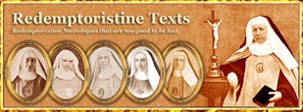
.jpg)









